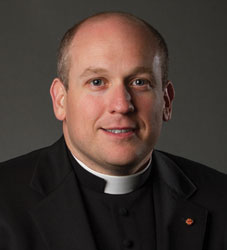 This week’s and last week’s Gospel passages for Sunday Mass are about discipleship. Last week (2nd Sunday in Ordinary Time) the call of Andrew, Peter, and another disciple was proclaimed to us as recorded by John. This Sunday (3rd Sunday in Ordinary Time) we have the calling of Andrew, Peter, James, and John proclaimed to us, as recorded by Mark. There are differences between the two accounts, but the differences are in the details. Both Mark and John agree on the focus of their accounts: Jesus called and his disciples followed.
This week’s and last week’s Gospel passages for Sunday Mass are about discipleship. Last week (2nd Sunday in Ordinary Time) the call of Andrew, Peter, and another disciple was proclaimed to us as recorded by John. This Sunday (3rd Sunday in Ordinary Time) we have the calling of Andrew, Peter, James, and John proclaimed to us, as recorded by Mark. There are differences between the two accounts, but the differences are in the details. Both Mark and John agree on the focus of their accounts: Jesus called and his disciples followed.
Again, we are presented with the importance of answering the Lord’s call to follow him. What does discipleship look like? Honestly, that depends on who you ask. When I was on faculty at Mundelein Seminary, before returning to the Cathedral, Bishop Robert Barron, then rector, offered three paths for seminarian formation, but these three paths are not about making priests, they are for making disciples. Discipleship is grounded in a relationship with Jesus and too often people confuse a relationship with the Church as a relationship with Jesus but they are too distinctive realities; our relationship with Jesus is animated and expressed through our relationship with the Church. Do you have a true relationship with Jesus?
The first path of discipleship is finding the center for our lives and there are many people, ideologies, behaviors and so on that want to vie for that position. The center must be Jesus. We cannot be true disciples if he is not center to who we are. Not close to the center and not near the center, but the center; being close may work when playing Horseshoes but not with true discipleship. Jesus Christ, not an idea of him but the actual person, must be the central reality of our lives. His life, love, and grace must be the grounding force of what guides and moves our thoughts, actions, and disposition. If anyone or anything else is occupying the center space of our lives then our discipleship is lacking and incomplete.
The second path is acknowledging that you are a sinner. For some people this may come as a shock, but, yes, all of us are sinners and this acknowledgement is vital for true discipleship. The Scriptures chosen for the Third Sunday in Ordinary Time point to this necessity. The beginning of Mark’s Gospel links the acceptance of Jesus’s call to repentance with the ability to accept his invitation to discipleship. If we are unwilling to acknowledge our need for a savior then our discipleship is false. Jesus has come to save us from our sins and to lead us back to the fullness of the Father’s love. Any good and lasting relationship requires that each party know and understand each other. If we cannot, or will not, acknowledge our own sinfulness and our need for redemption then Jesus cannot be for us the savior that he wants to be and therefore we cannot truly know him. Part of our free will means that the Lord will not go where he is not invited in our lives. We must acknowledge our need for his mercy and forgiveness. When we do, then we can truly begin to know him.
The third and final path is acknowledging that your life is not about you. Contrary to what the world tells us, as disciples we cannot have what we want, when we want it, no matter what. The Lord Jesus tells us plainly “whoever would be my disciple must deny himself, take up his cross, and follow me (Mt 16:24; Mk 8:34; Lk 9:23).” Our Lord’s life was rooted in sacrificial love and it must be the same for the disciple. Our lives are to be about Jesus Christ and the building up of his kingdom here and now. That is expressed in our love that is shown to our sisters and brother. If we are in love with ourselves then we are not able to walk this third path of discipleship.
These three paths ultimately form one path because all three are about enabling us to fully answer Jesus’s call to follow him. Jesus is calling each of us by name to true discipleship. Are you willing to walk the path to fully answer his call?